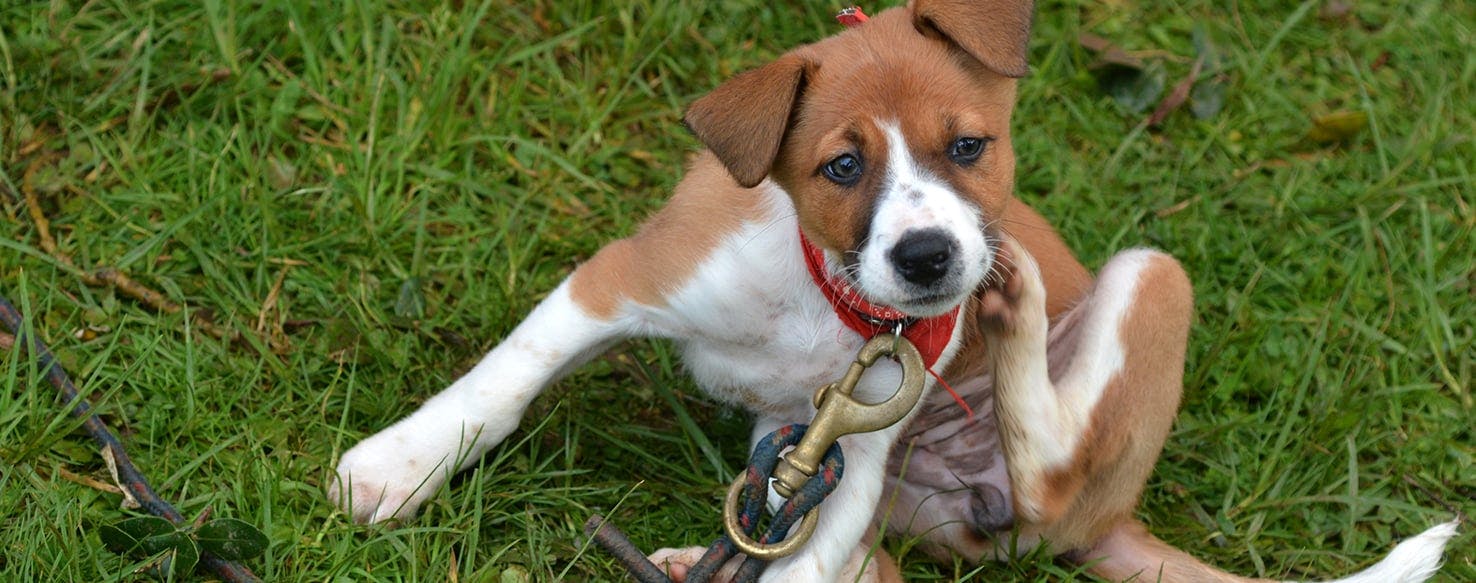- Home
- Dog Wellness
- Causes and Solutions for Itchy, Dry Skin in Dogs
3 min read
Causes and Solutions for Itchy, Dry Skin in Dogs

By Darlene Stott
Published: 06/08/2017, edited: 09/07/2022
Save on pet insurance for your pet
You don't have to choose between your pet and your wallet when it comes to expensive vet visits. Prepare ahead of time for unexpected vet bills by finding the pawfect pet insurance.
Is your dog itching and scratching, keeping both of you up all night? Not only is the distraction a nuisance to you, but it is also an uncomfortable aggravation for your furry companion. Sometimes the scratching, licking, or biting of their skin leads to hair loss and injury. Take your dog to the veterinarian to rule out the cause for the discomfort which may include the following:
- Flea or tick bites
-
Mites (mange)
-
Allergic reaction
-
Lack of nutrition in diet
-
Bathing with irritating soaps or shampoos
- Fungal infection
-
Hormone imbalance
-
Cold, dry weather
What Can I do for my Dog's Dry Skin?
Every dog is different, which is why it’s important to consider these preventative measures in relation to your pet’s unique medical history. A check-up with the veterinarian is the first step you should take to rule out conditions like flea bite allergy, fungal infection, or hormonal changes.
Environmental factors may play a part as well. Your furry buddy could be reacting to a new shampoo or have a parasitic infection that you cannot easily detect. Once the vet has given your dog a thorough examination and prescribed medication if needed, you can then take measures to maintain healthy skin and a soft coat.
Supplement the Diet
Feed your canine companion high-quality dog food that contains a balance of nutrients aimed at coat and skin maintenance. Supplement your dog's food with omega 3 fatty acids like fish, olive or coconut oil. Your dog's vet or a qualified pet nutritionist can advise on the quantity best for your pet, based on their current health status, age, and weight. You can also add a small amount of wet food to your dog's meal and be sure to supply plenty of water.
Use Proper Grooming Products
When bathing your dog, use a vet-approved shampoo. Some products are drying on the skin, especially if your pet is prone to skin issues. Never use shampoo meant for humans. They can be irritating to the skin and remove the natural oils from your pup's coat. Dog care products do not contain unnecessary perfumes and artificial coloring. Natural moisturizers like Vitamin E are compounded into dog-safe shampoos, improving the suitability for your companion. Remember, dogs do not need to be shampooed often. Doing so can lead to skin irritation and a flaky coat. In between shampoos, a quick wipe down with a moisturized wipe for dogs will do the trick.
Maintain Flea Prevention
Your veterinarian will prescribe a maintenance program to ensure that your dog stays free of fleas, ticks, and parasites. Flea and tick bites can lead to itchy and irritated skin, and parasitic infections like mange can become serious if left untreated. Secondary infection from intense itching and scratching is not uncommon. The bonus of maintaining flea prevention is that your dog will be protected from worms as well.
Should my Dog see the Vet?
If your dog has any of these symptoms, consult the vet:
- Visibly itchy skin could mean mange, flea bite allergy, or a bacterial infection
- Hair loss can indicate ringworm or hormonal changes caused by an underlying disease
- If your dog's skin has an odor, there may be a yeast infection
- Redness points to inflammation that may lead to secondary problems and injury of the skin
- Crustiness must be attended to because it often indicates fungus or parasites
You may also like
